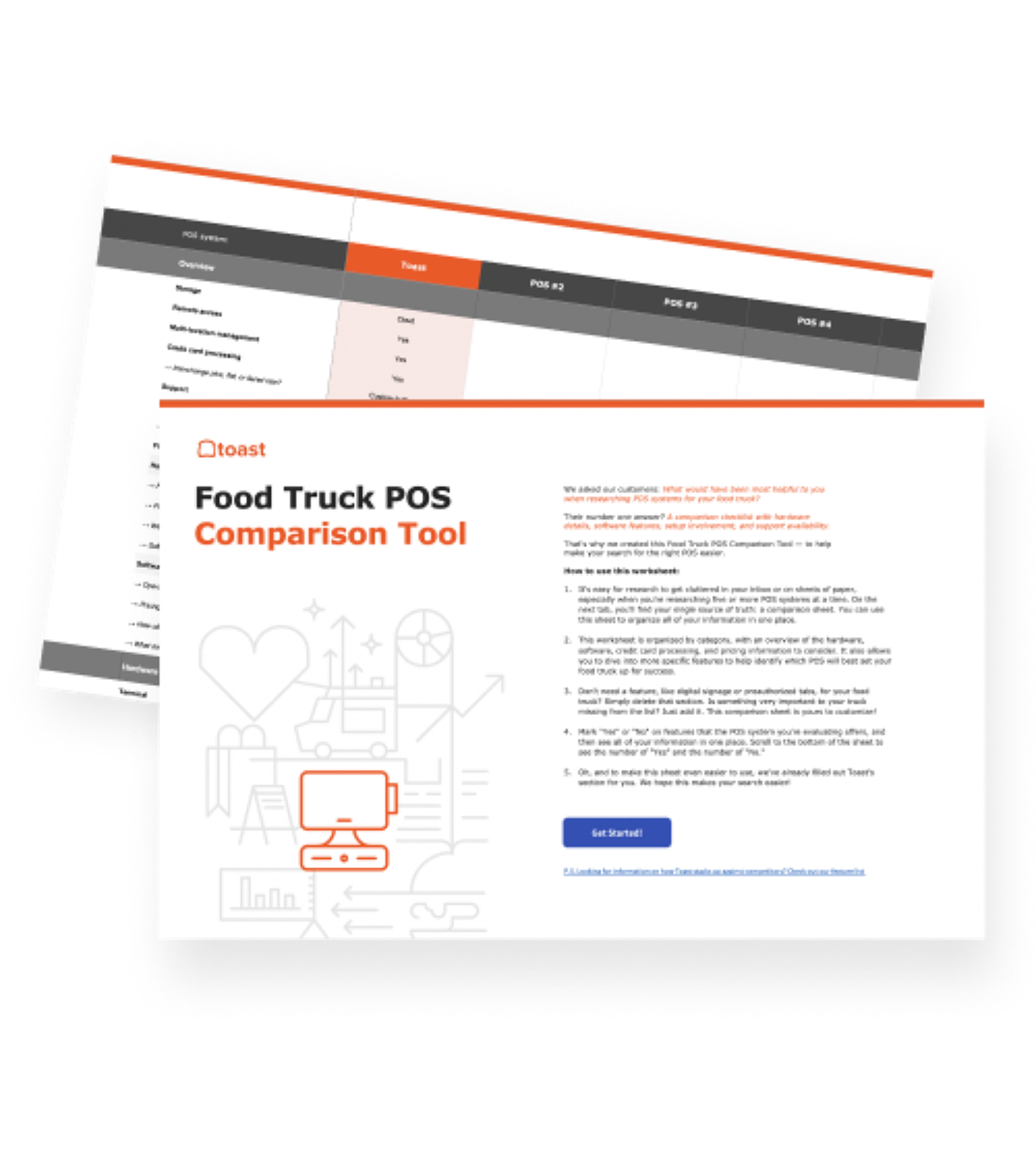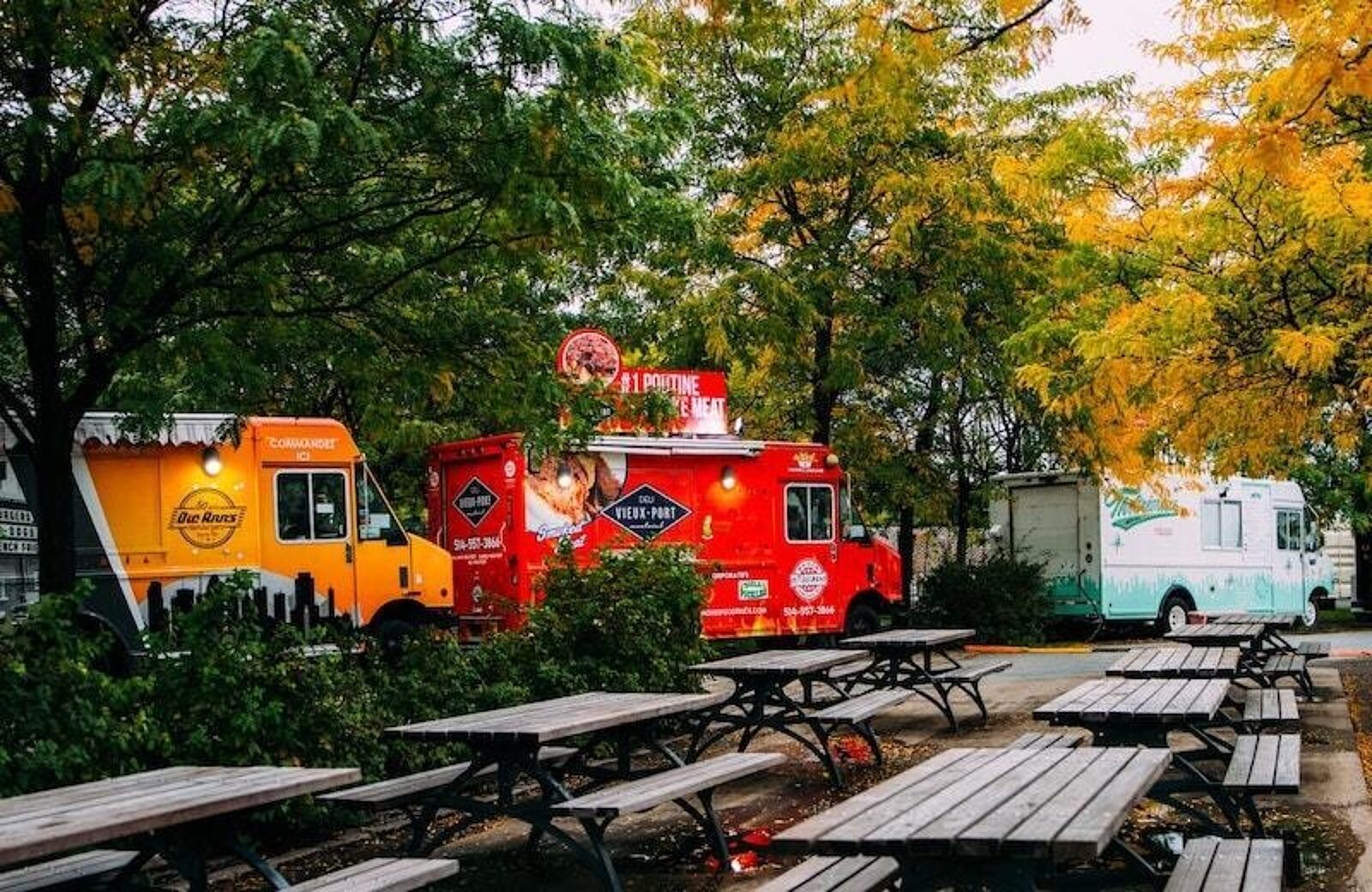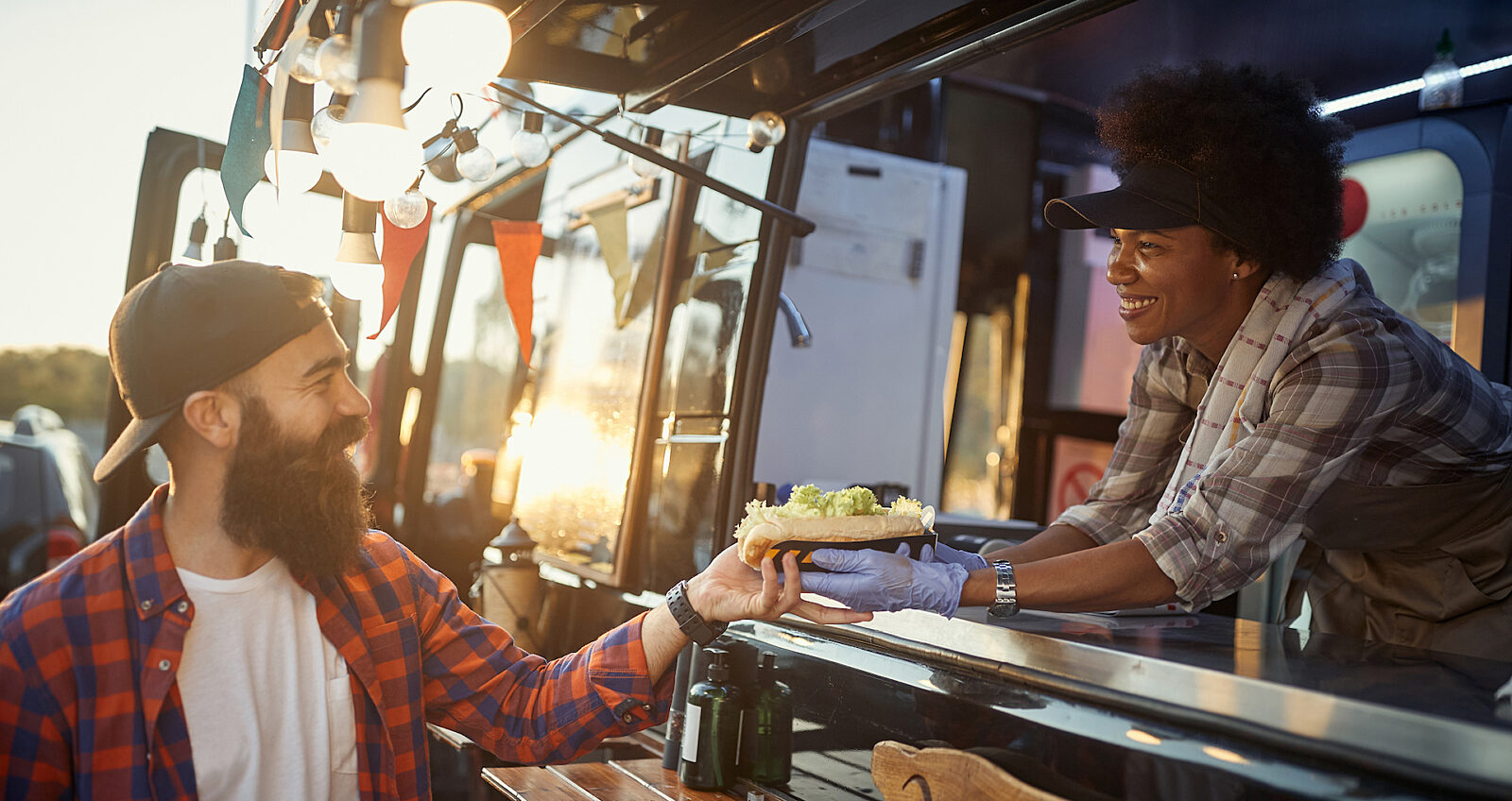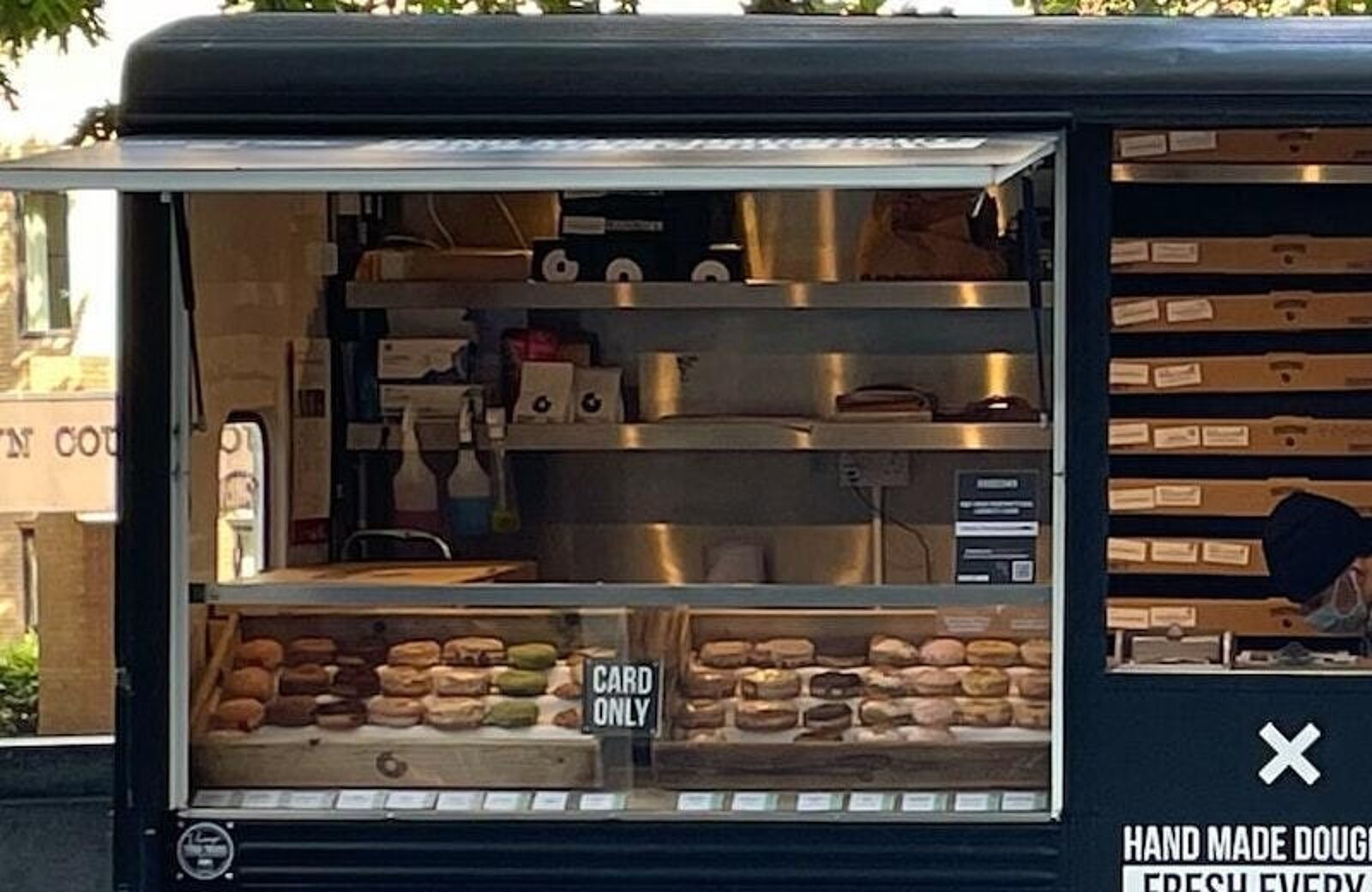
Essential Food Truck Equipment List: Equipment Needed to Start a Food Truck
Food doesn’t make itself. Bring everything you need on the road with this ultimate food truck equipment guide.
Tyler MartinezAuthor


Food Truck POS Comparison Tool
A free, customizable Food Truck POS Comparison Tool to research and compare point of sale systems in one Excel spreadsheet or editable PDF.
Get free downloadIt’s no secret that food trucks are small, so rather than stuffing all your kitchen equipment and supplies into one small area, you should carefully consider what you need to maximize the limited space available.
Creating a food truck business plan will help you figure out what equipment you’ll need. For instance, you’ll require different cooking utensils depending on whether you plan for a fully mobile kitchen or for a small truck as an add-on to a commissary or restaurant kitchen.
Whatever your food truck ideas, you should always consider the costs of buying equipment, maintaining crucial machines, and replacing fragile or single-use items. In this guide, I’ll provide you with my ultimate food truck equipment list to help you identify exactly what you need to get your new business up and running.
What’s in This Guide?
Essential Food Truck Equipment List
Food Truck Equipment Costs
What to Consider Before Buying Restaurant Equipment
Detailed Food Truck Equipment Checklist
Use Toast for Your Food Truck
FAQs
Food Truck Business Plan Template
Use this free food truck business plan template to easily create a great business plan that organizes your vision and helps you start, grow, or raise funding for your food truck.

What equipment do you need in a food truck?
A food truck is essentially a mobile restaurant, which means most essential equipment is for cooking food and serving customers. The food truck supplies you’ll require will depend on the kind of food you’re making and the preparation work you’ll do.
Below, I’ve compiled a complete list of all the necessary equipment and essential items for running a successful food truck so you can start stocking your truck with the right equipment immediately.
Essential food truck equipment
Ovens
Grills and Ventilation
Gas Ranges
Flat Ranges
Induction Heaters
Smokers
Small-Space Ventilators
Microwaves
Freezers and Refrigerators
Ice Maker
Food Prep Surfaces
Food Prep Equipment
Knives
Cutting Boards
Paper Towels
Pots and Pans
Mixing Bowls
Food Processors
Blenders
Mixers
Storage Containers and Shelving
Safety Equipment
Gloves
Aprons
First Aid Kit
Date Labels
Sani-Buckets
Bar Rags
Food Grade Chemical Supplies
Chemical Safety Data Sheets
Sinks
Water Tanks
Compartment Sinks
Disposal Sinks
Hand Sink
Restaurant Point-Of-Sale System
Kitchen Display System (KDS)
Serviceware
Table Service Essentials
Paper Boats, Plates, or Clamshells
Utensils
Napkins
What to consider before buying restaurant equipment
Before you can sell your gourmet burgers or frozen treats, you have to make sure your food truck is properly kitted out with everything you need to make those buttery rolls and french fries on the go. Imagine yourself cooking large quantities of your food truck menu items on a commercial scale and note down all the equipment you’ll need from start to finish.
I’ve learned that taking a measured approach when selecting and purchasing equipment for your food truck is extremely beneficial, as this can save you time and effort down the line and keep your business running smoothly. I find that it’s a good idea to choose high-quality equipment that’s reliable and easy to maintain.
Here are seven things you must consider before you begin purchasing equipment for your food truck:
1. Equipment Quality
Your kitchen equipment will be one of your biggest investments since it’s essential for your food truck’s operations and ability to generate profit. As a result, choose high-quality and durable equipment from reliable sellers. It’s also well worth researching high-dollar purchases like mixers, ovens, and knives. Scrutinize and compare new and used equipment with the same criteria to be sure of your investment.
2. Available Space
The space available in your food truck is a crucial factor in deciding what supplies to buy and where they will be stored. You won’t be able to build a full industrial kitchen in your food truck, so pick your cooking equipment wisely. Choose only the essential tools for preparing the items on your menu, and be sure that the models you buy will fit into your plan.
3. Interior Planning
Working in a kitchen that hasn’t been designed for the cooking you do there is frustrating, time-consuming, and can harm service quality and profit. Design your food truck kitchen, either by yourself or with the help of a kitchen planning consultant, according to your menu and service style so that everything runs smoothly. A consultant can provide expert advice on how to select only the necessary kitchen equipment for the space available.
4. Use and Cleaning
Equipment is only worthwhile if it's easy to use and maintain. Consider how comfortable each piece of kit is to use, how well it performs its function, and how you would clean it. Train staff on how to clean and maintain equipment daily, weekly, and monthly to optimize the performance of your utensils. The NSF symbol on food equipment ensures that it meets food safety certification standards.
5. Suppliers
As with any business, food trucks are built on healthy relationships with your suppliers. Many towns and cities have local restaurant supply stores that, for a membership fee, offer premium ranges of equipment at near-wholesale prices. The best suppliers will be honest about the technology, engineering, and safety of the products they sell and provide installation, maintenance, and repair services.
Once you have a comprehensive list and a vision of your fully equipped food truck, you can start shopping around and sourcing suppliers. Local restaurant wholesalers often have good deals, as do certain reputable online retailers. Alternatively, you can lease equipment until you can afford to invest.
New equipment may seem like the best choice, but some expensive (and essential) pieces of equipment are better bought second-hand. For instance, sourcing an oven or under-counter freezer that has been well-maintained over the years will be a lot cheaper than buying one new.
6. Pricing
When budgeting for food truck equipment, prioritize the quality of the equipment by how important each piece is to your process. If you’re making pastry, for example, a dough sheeter might be your expensive best friend. Meanwhile, top-of-the-range ice cream freezers should be a high priority for dessert and ice cream trucks.
The most important equipment warrants the highest quality and expenses, as this will give you a better ROI in the long term. Buying used equipment might save you some money upfront but could cost more in maintenance and repairs later.
7. Financing and Leasing
Make sure you research your restaurant financing options before you commit to any purchases. If this article is making you anxious about affording all the nice food truck equipment, renting or leasing equipment can be a good option to get your business started and assume less risk until you’re sure the model will succeed.
Ultimate food truck equipment checklist
Ovens & Microwaves
While not every food truck will need an oven, many restaurant business models require high-quality commercial ovens. If you do need an oven, ask yourself if it’s the smartest move to keep a potentially 400°F oven in your truck. Summer days can get quite hot in many areas, and it might be best to bake in a commissary kitchen instead.
Not only are ovens hot, but they are also large and bulky, which is inconvenient in a food truck. Of course, if it's essential for your business to have an oven in your truck, you must find a way to make it work.
Commercial convection ovens use powerful fans to circulate heat around the food so that it cooks quickly and evenly. They are great for baked goods and roasting. Meanwhile, combination ovens use steam and circulated heat and are perfect for baking bread, steaming, or roasting. Wood-fired pizza ovens can be versatile tools, but you’d only want one if you have a specialized item on the menu.
You could also opt for a microwave in your food truck, either as the sole heat source or as a perfect addition to an oven. Microwaves are staple items of restaurant equipment that are great for cooking certain foods in a fraction of the time as others. They are also cost-effective and space-saving.
Ranges, Grills & Ventilation
Deciding on a heat source to use while on the road is crucial when compiling your food truck equipment list. Factor in the kind of food you’ll be making and how you can provide yourself or your staff with the best cooking experience. Here are some of your options when it comes to heat sources for your food truck:
Gas Range: A butane-powered range is an ideal choice for a heat source on the go. Gas is an efficient method of cooking food; it’s easy to control, versatile, and reliable. Induction heaters can offer more sustainability, and flat ranges are better for certain kinds of cooking, but a gas range is a solid investment.
Flat Range: Flat ranges are sustainable, requiring very little electricity to operate over extended periods of time. This makes them perfect for cooking certain kinds of food, such as burgers, eggs, pancakes, and bacon, and finishing burritos and sandwiches.
Induction Heaters: Induction burners generate an electromagnetic current to heat a surface. Magnetic metals transfer heat the best and can be used to heat glass or other surfaces. Induction is a sustainable, versatile, space-conscious, and cost-effective option for many kinds of food trucks.
Smokers: Smokers cook meats or vegetables by exposing them to low heat and curing them with smoke over a long time. Some food trucks are dedicated to smokers or BBQ pits and often have custom kitchen equipment built for their trucks.
If you opt for a heater in your food truck, you must ensure you have sufficient small-space ventilation. Gas or electric ranges and ovens that generate a lot of heat or steam require proper ventilation, and installing a commercial system in a food truck is a difficult but necessary step. Be sure to budget realistically for ventilation and sprinklers over gas ranges or deep fryers.
Think about the size and available space of your kitchen and ensure that your ventilation system has enough power to keep smoke and hot air out of the space you have to work in. Ventilation is crucial for providing a safe kitchen environment.
Freezers & Refrigerators
These monster machines are necessities in food trucks, particularly if you serve cold food like desserts. As a result, it’s crucial to plan space for fridges and freezers so you can store food at the proper temperature. For example, you could plan for under-counter freezers that fit neatly under your food prep areas or buy specialist ice cream freezers if you plan to serve a lot of desserts.
You may also need an ice maker if you intend to serve drinks from anything except a bottle. Many beverages require ice, such as soft drinks, alcoholic cocktails, smoothies, and iced coffee.
Food Preparation Surfaces
A professional kitchen setup typically comes with stainless steel counters and cooking surfaces. They are easy to sanitize and ensure you don’t transfer unwanted extra heat at crucial steps in the preparation process.
Meanwhile, wood surfaces are cost-effective and can be refinished, concrete countertops are durable, and granite is cooler than even stainless steel. Each food prep surface has its benefits, but stainless steel works just fine for most operations. When starting a food truck business, you should pick a surface material that suits your menu items and budget.
Food Prep Equipment & Cooking Utensils
All the small appliances, utensils, mixing bowls, and other necessary equipment for your production process will need to stay stocked in your food truck. After all, you don’t want to be caught in a rush without a vital piece of equipment.
Knives: Knives are a central part of cooking and food prep, and a good chef and their knife move as one. Invest in a set of knives and learn how to keep them sharp for both safety and efficiency in the kitchen. You’ll also want a sharpening stone to keep your investment in good condition.
Cutting Boards: Quality cutting boards make a noticeable difference in the prep experience. The best chopping boards have lips or grooves around the edges to keep liquid on the board and handles for ease of use. Make sure to buy various colors for different types of food and assign them as follows: red for meat, blue for fish, green for veggies, and yellow for chicken.
Pots & Pans: You are free to choose your pots and pans by personal preference and necessity, but make sure to select quality pieces that will become assets to your food truck. Pots and pans are valuable, essential pieces of kit that last a long time when properly cleaned.
Mixing Bowls: Mixing bowls come in a variety of materials that each have benefits and drawbacks. Decide between plastic, stainless steel, ceramic, glass, or a combination of different materials to find what works for your food truck.
Food Processors: Food processors are great for soups and sauces and for ensuring that you get an even chop or mince during prep. They’re for sure a worthwhile investment.
Blenders: Certain businesses – smoothie shops and juice bars in particular – rely on quality blenders as essential equipment. While they can be expensive, commercial blenders are reliable.
Mixers: Stand and hand mixers are invaluable time-saving equipment for bakeries and other business models, and they might be a necessity for your food truck or commissary kitchen.
Storage Containers & Shelves: Storage is always essential, both for safety and organization, but the cost can add up quickly. Don’t forget to budget for space and money for storage.
Other Restaurant Equipment: This is probably the most important category. It includes all the stirring spoons, whisks, rolling pins, spatulas, piping bags, silicone pads, and anything else you’ll need to outfit your food truck for operation. These little things add up, so it’s crucial to plan and budget for them. For small pieces that are easily misplaced, be sure to buy backups.
Serviceware
Your food truck’s serviceware plays a big part in your brand's experience and aesthetic. Make choices that are true to your style while being sustainable for your business model. For instance, choose napkins over linen if you don’t want to come off as too pretentious, but if that’s exactly the kind of vibe you want, by all means budget for linen serviettes!
While table service isn’t usually a concern for food trucks, you might find yourself with the opportunity to set a few tables. Consider durable plates and utensils and decide whether to provide salt and pepper shakers and condiment dispensers.
Deciding on your takeout serviceware is the most crucial decision for food truck owners. You could opt for paper boats, plates, boxes, or clamshells and choose the material you’d like. Sustainable solutions are more expensive but are great for your brand.
Safety Equipment
All restaurants are held to food safety standards and must have certain essential equipment on hand. Restaurant supply services provide food trucks and catering companies with a range of necessities, including (but not limited to):
Gloves
Aprons
First Aid Kit
Date Labels
Sani-buckets
Bar Rags
Food Grade Chemical Supplies
Chemical Safety Data Sheets
Sinks
Restaurant sinks must be dedicated to different uses, which means you'll likely have to find space for two or three in your food truck’s layout. Compartment sinks with different stations for washing, rinsing, and sanitizing are common pieces of restaurant equipment and will help your food truck business comply with safety standards.
You may also need a disposal sink to accommodate liquid waste or greywater from dishwashing, as well as a hand sink for employees to scrub their hands. Check out our restaurant cleaning checklist for more information on how to keep your food truck spotless and safety-compliant.
Kitchen Display System (KDS)
Your kitchen display system will help you and your staff visualize orders and fulfill them more efficiently. But while you might have a romantic vision of yelling orders to your fry cook in a clever shorthand language, kitchen display systems that integrate into your food truck’s point-of-sale system will result in even smoother, more efficient service.
Restaurant Point-of-Sale (POS) System
The restaurant point-of-sale system provides a technological answer for many of the complexities of operating a food truck or any restaurant business in the past. Crucially, it also provides a way to integrate inventory management and online orders into the normal POS flow of operations, and it does all this while tracking sales and the performance of your menu.
Food Truck Opening & Closing Checklist
The beginning and end of a shift can be frantic. Use this free PDF checklist to set your food truck staff up for success.

Equip your food truck with Toast Tech
Restaurant technology like POS and kitchen display systems are essential equipment for your food truck. At Toast, we provide the best food truck POS systems to all kinds of businesses, from mobile burger vans to ice cream trucks.
But it’s not just our POS systems that we’re proud of - we also provide premium-grade payment processing kits, necessary equipment for catering and events companies, and expert guidance on managing your staff.
Try the Toast demo today to give your food truck the best chance of success.
Related Food Truck Resources
FAQs
What type of equipment is in a food truck?
Your food truck needs to contain all the essential equipment to cook food and serve customers. In addition to large appliances like grills, ovens, and freezers, you’ll need a range of cooking utensils and cleaning products. Knives, cutting boards, napkins, take-out packaging, mixing bowls, blenders, and plates are all vital pieces of kit for a food truck.
Can you have a deep fryer in a food truck?
Deep fryers are useful pieces of equipment for fast food restaurants and establishments that serve fried cuisine. If you have enough space and your business model demands it (for example, if you mostly serve french fries and chicken wings), you can fit a deep fryer inside your food truck. Just remember to follow all the necessary safety precautions and clean it regularly.
Can you put a pizza oven in a food truck?
Ovens are common cooking appliances, but they can be problematic inside a food truck. They take up lots of space and will make the van incredibly hot, so you have to ensure your truck stays well-ventilated. That said, if your business model needs a pizza oven, you can fit one inside a food truck.
Is this article helpful?
DISCLAIMER: This information is provided for general informational purposes only, and publication does not constitute an endorsement. Toast does not warrant the accuracy or completeness of any information, text, graphics, links, or other items contained within this content. Toast does not guarantee you will achieve any specific results if you follow any advice herein. It may be advisable for you to consult with a professional such as a lawyer, accountant, or business advisor for advice specific to your situation.
Read More
Subscribe to On the Line
Sign up to get industry intel, advice, tools, and honest takes from real people tackling their restaurants’ greatest challenges.



